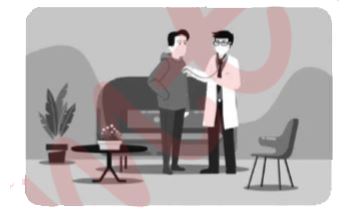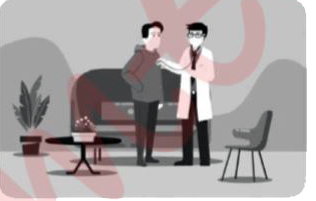A cadiadate has to reach the examination centre in time, Probality of him going by bus or scooter or by other means of transport are 310,110,35 respectively. The probability of getting late , if the travels by bus is 1/4 ,1/3 if he travells by scooter and 0 for any other medium. But he reaches in time if the uses any mode of transport . He reached late at the centre. The probability that he travelled by bus is -
19
213
913
None of these
The correct Answer is:C
To solve the problem step by step, we will use the concept of conditional probability and the law of total probability.
Step 1: Define Events
Let:
- A: Event that the candidate travels by bus.
- B: Event that the candidate travels by scooter.
- C: Event that the candidate travels by other means.
- E: Event that the candidate is late.
Step 2: Given Probabilities
From the problem, we have the following probabilities:
- P(A)=310 (Probability of traveling by bus)
- P(B)=110 (Probability of traveling by scooter)
- P(C)=35 (Probability of traveling by other means)
Step 3: Calculate Total Probability
Since the total probability must equal 1, we can check:
P(A)+P(B)+P(C)=310+110+35=310+110+610=1
This confirms the probabilities are correct.
Step 4: Given Conditional Probabilities of Being Late
We also have the conditional probabilities of being late:
- P(E|A)=14 (Probability of being late given he travels by bus)
- P(E|B)=13 (Probability of being late given he travels by scooter)
- P(E|C)=0 (Probability of being late given he travels by other means)
Step 5: Use the Law of Total Probability
We need to find the total probability of being late P(E):
P(E)=P(A)⋅P(E|A)+P(B)⋅P(E|B)+P(C)⋅P(E|C)
Substituting the values:
P(E)=(310⋅14)+(110⋅13)+(35⋅0)
Calculating each term:
P(E)=340+130+0
Step 6: Find a Common Denominator
To add 340 and 130, we find the least common multiple of 40 and 30, which is 120.
340=3×340×3=9120
130=1×430×4=4120
Now, adding these:
P(E)=9120+4120=13120
Step 7: Find the Probability of Traveling by Bus Given Late
We want to find P(A|E) using Bayes' theorem:
P(A|E)=P(E|A)⋅P(A)P(E)
Substituting the values:
P(A|E)=P(E|A)⋅P(A)P(E)=(14)⋅(310)13120
Calculating the numerator:
14⋅310=340
Now substituting:
P(A|E)=34013120=340⋅12013=3⋅313=913
Final Answer
Thus, the probability that he traveled by bus given that he reached late is:
913
Let:
- A: Event that the candidate travels by bus.
- B: Event that the candidate travels by scooter.
- C: Event that the candidate travels by other means.
- E: Event that the candidate is late.
From the problem, we have the following probabilities:
- P(A)=310 (Probability of traveling by bus)
- P(B)=110 (Probability of traveling by scooter)
- P(C)=35 (Probability of traveling by other means)
Since the total probability must equal 1, we can check:
P(A)+P(B)+P(C)=310+110+35=310+110+610=1
This confirms the probabilities are correct.
We also have the conditional probabilities of being late:
- P(E|A)=14 (Probability of being late given he travels by bus)
- P(E|B)=13 (Probability of being late given he travels by scooter)
- P(E|C)=0 (Probability of being late given he travels by other means)
We need to find the total probability of being late P(E):
P(E)=P(A)⋅P(E|A)+P(B)⋅P(E|B)+P(C)⋅P(E|C)
Substituting the values:
P(E)=(310⋅14)+(110⋅13)+(35⋅0)
Calculating each term:
P(E)=340+130+0
To add 340 and 130, we find the least common multiple of 40 and 30, which is 120.
340=3×340×3=9120
130=1×430×4=4120
Now, adding these:
P(E)=9120+4120=13120
We want to find P(A|E) using Bayes' theorem:
P(A|E)=P(E|A)⋅P(A)P(E)
Substituting the values:
P(A|E)=P(E|A)⋅P(A)P(E)=(14)⋅(310)13120
Calculating the numerator:
14⋅310=340
Now substituting:
P(A|E)=34013120=340⋅12013=3⋅313=913
Thus, the probability that he traveled by bus given that he reached late is:
913
Topper's Solved these Questions
Similar Questions
He reached late by one and a quarter hours
View SolutionA doctor is to visit a patient. From the past experience, it is known that the probabilities that he will come by train, bus , scooter or by other means of transportation are respectiely 310,15,110 or 25. The probabilities that he will be late are 14,13 and 112 if he comes by train, bus and scooter respectively but if he comes by other means of transport, then he will not be late. If the arrives late, find the probability that he comes by train.
View Solution
Knowledge Check
He goes everywhere ____. He doesn't take any mode of transport.
Aby walkBrunCon feetDon footA person goes to the office either by a car, or scooter, or bus, the probability of which being 27,37,27 respectively. The probability that he reaches office late if he takes a car, or scooter, or bus is 29,19,49 respectively. If he reaches office in time, the probability that he travelled by car is k, then the value of 24k+7 is equal to
A7B14C212D312A doctor is to visit a patient. From the past experience, it is known that the probabilities that the he will come by cab, metro, bike or by other means of transport are respectively 0.3, 0.2, 0.1 and 0.4. The probabilities that the he will be late are 0.25, 0.3, 0.35 and 0.1 if he vomes by cab, metro,bike and other means of transport respectively.

Based on the above information, answer the following questions.
When the doctor arrives late, what is the probability that he comes by bike ?A521B47C56D16
A doctor is to visit a patient. From the past experience, it is known that the probabilities that he will come by train, bus, scooter or by other means of transport are respectively 310,15,110and25.The probabilities that he will be late are 14,13and112 if he comes by train, bus and scooter respectively, but if he comes by other means of transport, then he will not be late. When he arrives, he is late.
What is the probability that he comes by train
View SolutionA person goes to office either by car, scooter, bus or train probability of which being17,37,27and17 respectively. Probability that he reaches office late, if he takes car, scooter, bus or train is 29,19,49and19 respectively. Given that he reached office in time, then what is the probability that he travelled by a car?
View SolutionThe probability that a person will travel by plane is 35 and that he will travel by train is 14. What is the probability that he (she) will travel by plane or train?
View SolutionA doctor is to visit a patient. From past experience, it is known that the probabilities that he will come by train, bus, scooter or by car are repectively 310,15,110and25. The probabilities that he will be late are 14,13and112, if he comes by train, bus and scooter respectively, but if he comes by car, he will not be late. When he arrives, he is late. What is the probability that he has come by train ?
View SolutionA doctor is to visit a patient. From the past experience, it is known that the probabilities that the he will come by cab, metro, bike or by other means of transport are respectively 0.3, 0.2, 0.1 and 0.4. The probabilities that the he will be late are 0.25, 0.3, 0.35 and 0.1 if he vomes by cab, metro,bike and other means of transport respectively.

Based on the above information, answer the following questions.
When the doctor arrives late, what is the probability that he comes by cab ?
View Solution
